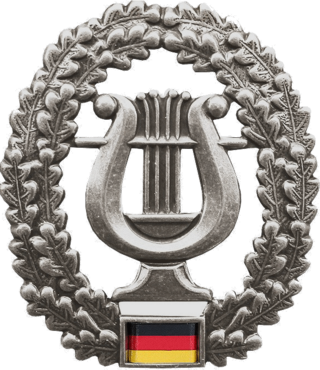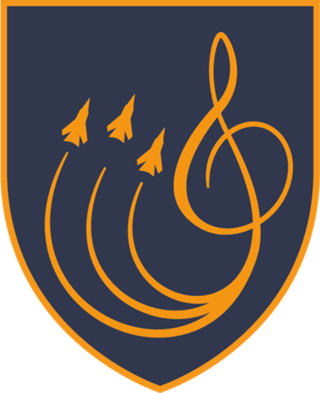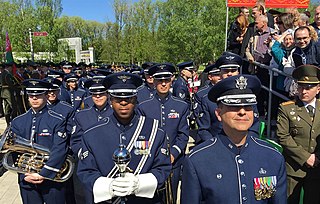
Hanover is the capital and largest city of the German state of Lower Saxony. Its 535,932 (2021) inhabitants make it the 13th-largest city in Germany as well as the fourth-largest city in Northern Germany after Berlin, Hamburg and Bremen. Hanover's urban area comprises the towns of Garbsen, Langenhagen and Laatzen and has a population of about 791,000 (2018). The Hanover Region has approximately 1.16 million inhabitants (2019).

The Bundeswehr is the armed forces of the Federal Republic of Germany. The Bundeswehr is divided into a military part and a civil part, the military part consisting of the German Army, the German Navy, the German Air Force, the Joint Support Service, the Joint Medical Service, and the Cyber and Information Domain Service.

The Federal Ministry of Defence, abbreviated BMVg, is a top-level federal agency, headed by the Federal Minister of Defence as a member of the Cabinet of Germany. The ministry is headquartered at the Hardthöhe district in Bonn and has a second office in the Bendlerblock building in Berlin, which is occasionally used colloquially to denote the entire Ministry.
The Military Counterintelligence Service is one of the three federal intelligence agencies in Germany, and is responsible for military counterintelligence. The other two are the Bundesnachrichtendienst , which is the foreign intelligence agency, and the Bundesamt für Verfassungsschutz which is the domestic civilian intelligence agency.

The Großer Zapfenstreich is a military ceremony performed in Germany and Austria. It is similar to the military tattoo ceremony performed in English-speaking countries, and is the most important ceremonial act executed by the German federal armed forces, the Bundeswehr, and by the Austrian federal armed forces Bundesheer. The Zapfenstreich is performed only during national celebrations and solemn public commemorations, to honour distinguished persons present at such special events. Examples are the farewell ceremony for a German federal president, or at the conclusion of large military exercises. It takes place in the evening hours and consists of a military formation of at least one military band, two platoons of armed infantrymen, and two lines of soldiers carrying torches, in total about 400 men.

The Band of the Coldstream Guards is one of the oldest and best known bands in the British Army, having been officially formed on 16 May 1785 under the command of Major C F Eley.

A fanfare band, fanfare corps, fanfare battery, fanfare team, horn and drum corps, bugle band, drum and bugle corps, or trumpet and drum band is a military or civilian musical ensemble composed of percussion instruments, bugles, natural horns and natural trumpets. Fanfare bands are the descendants of the old medieval trumpet and drum teams that sounded fanfares on important occasions and are related to drum and bugle corps internationally.
The Armeemarschsammlung, also known as the Prussian Army March Collection refers to the basic catalog of works of German military march music.

Siegfried Strohbach was a German composer and conductor. He founded and directed choirs and the vocal ensemble Collegium Cantorum and is notable for the composition of choral music. He was a conductor of major theaters of Lower Saxony and a professor of the Musikhochschule Hannover as well as a composer.

There are 15 military bands of the Bundeswehr, including those of the German Army, Air Force, Navy, and joint bands. Before 2009, the military musicians of the Bundeswehr constituted a joint specialist service, the Military Music Service, subordinate to the Armed Forces Office. In 2009, as part of a larger reorganisation of the Bundeswehr, the organization of the Military Music Service was replaced by the new Military Music Center of the Bundeswehr in Bonn, and several bands were disbanded. The bands of the Bundeswehr provide music for official ceremonies such as the Großer Zapfenstreich and the swearing-in of new recruits. In addition to their traditional military music repertoire, they perform concert band and light music, as well as genres such as jazz, rock, and pop.

Air Force Band Münster was founded in 1958 to serve as a military band for the German Air Force. It was initially formed in Uetersen as a single unit, Air Force Band 1. Two more were created in March 1959. Following this, the three units were garrisoned in Karlsruhe, Münster, and Neubiberg. On 26 October 2011, the merging of the three bands was announced by the Federal Minister of Defence in the course of a planned reform. On 24 March 2014, the three Air Force Bands combined to form Air Force Band Münster, or Air Force Band 3.

The Staff Band of the Bundeswehr is the main representative brass band of the Bundeswehr, stationed in Berlin. It works together with the Wachbataillon in the Berlin Garrison Command, having responsibility for protocol during state receptions of the Federal President, Chancellor and the Minister of Defense. The band is responsible for performing pieces such as the anthems of foreign countries as well as the Preussischer Präsentiermarsch during arrival honors ceremonies for visits by foreign leaders to Germany. It is among 6 other German military bands that fall under the command of the Joint Support Service.

The Multinational CIMIC Command, is the fourth generation of Civil-military co-operation of the Bundeswehr. The first predecessor was already formed in 2001 out of parts of the German Army (Heer), the German Air Force (Luftwaffe) and the German Navy (Deutsche Marine) as part of the Joint Support Service (Streitkräftebasis) at the Clausewitz-Barracks in Nienburg, Lower Saxony. In 2017 it employs around 200 soldiers and Civil Servants Additional to this the centre receives support by the local state commands (Landeskommando) of the States of Germany (Bundesländer) and the academy of the Federal Office for Civil Protection and Disaster Assistance in Bad Neuenahr.
The Royal Australian Air Force Band is the Royal Australian Air Force's official music branch. The current commanding officer is Squadron Leader Daniel Phillips. The Director of Music is Flight Lieutenant Aaron Michael. The Air Force Band's mission is to promote and enhance the image, reputation and culture of the Air Force. The band represents Air Force at significant events in Australia and abroad.

The Military Music Service of the National People's Army was made up of the Military Bands of the Nationale Volksarmee and the Corps of Drums of the Military Music Service.

The 686th Air Force Band, known also as the United States Air Forces in Europe Band (USAFE Band) is composed of 45 active duty Air Force musicians who serve under the United States Air Forces in Europe - Air Forces Africa Command and work as musical ambassadors to European nations in NATO and the European Union. Through numerous radio and television broadcasts, and performances, the USAFE Band provides American music to the troops of USAFE.

The Air Force Band Erfurt is a German Air Force (Luftwaffe) military band founded in 1991 to provide musical support to the city of Erfurt and the German Air Force. Its area of responsibility spans across the German states of Thuringia, Saxony, Saxony-Anhalt, Brandenburg and northern Bavaria. The 56 member band has travelled internationally to concerts in Belgium, France, Great Britain, Canada, Poland, and the United States. Its scope of duties include protocol operations such as state visits and military parades, as well as other events such as charity concerts.

Navy Band Kiel is a military band of the German Navy responsible for raising the esprit de corps or morale of personnel of the Navy. The 50 member band has an area of responsibility for the northern German state of Schleswig-Holstein. It also covers the entire coastal region on the at the North Sea and Baltic Sea, with the states of Lower Saxony and Mecklenburg-Vorpommern as well as the cities of Bremen and Hamburg.

The Training Band of the Bundeswehr is the Bundeswehr's training music corps. It is responsible for training new musicians. It was created in Siegburg on 1 July 1960 and has been stationed in Hilden since 1969. It is subordinate to the other 13 music bands of the Bundeswehr and the Military Music Center of the Bundeswehr in Bonn. Every year the training band goes on a concert tour to demonstrate the success of their training. The task of the training band is to pave the way for young musicians to become professionals and to prepare them for future service in the Bundeswehr. Many members of the vand come from the Robert Schumann Hochschule in Düsseldorf. It consists of a teaching staff, three officers and one bandmaster, which coordinate and manage the training company, which offers can accommodate up to 150 musicians.

The Mountain Band of the Bundeswehr is a military band in the German Bundeswehr. It is based in Garmisch-Partenkirchen, a mountain resort in Bavaria, southern Germany. It was originally established as the band of the 1st Mountain Division and is now associated with Military District IV. It was established as the band of the 1st Mountain Division in 1956 in Sonthofen. After being temporarily stationed in Munich and Mittenwald, it finally was permanently based in Garmisch-Partenkirchen in 1963.



















